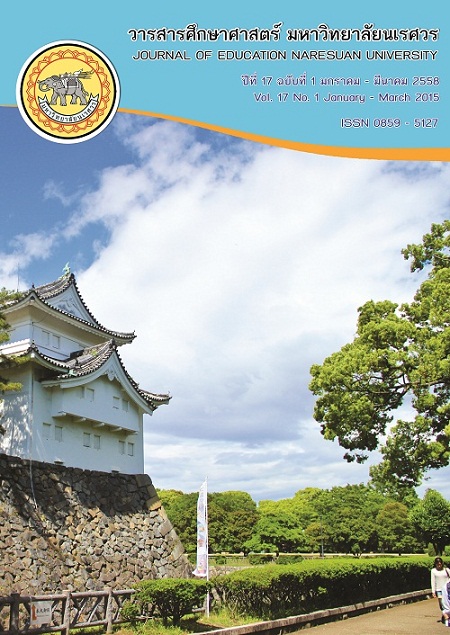รูปแบบของปัจจัยเชิงสาเหตุพหุระดับที่ส่งผลต่อประสิทธิผลการบริหารงานวิชาการในโรงเรียนมัธยมศึกษา
Main Article Content
Abstract
บทคัดย่อ
การวิจัยครั้งนี้มีวัตถุประสงค์เพื่อสร้างและประยุกต์ใช้รูปแบบของปัจจัยเชิงสาเหตุพหุระดับที่ส่งผลต่อประสิทธิผลการบริหารงานวิชาการในโรงเรียนมัธยมศึกษา มีวิธีดำเนินการ 4 ขั้นตอน คือ 1) การศึกษาปัจจัยและสร้างรูปแบบเชิงสมมติฐาน โดยการศึกษาเอกสารและงานวิจัยที่เกี่ยวข้อง วิเคราะห์ข้อมูลโดยการสังเคราะห์เนื้อหา 2) การตรวจสอบและปรับปรุงรูปแบบ โดยการสัมภาษณ์ผู้เชี่ยวชาญ วิเคราะห์ข้อมูลโดยการสังเคราะห์เนื้อหา 3) การตรวจสอบและปรับปรุงรูปแบบให้สอดคล้องกับข้อมูลเชิงประจักษ์ โดยใช้โปรแกรมสำเร็จรูปเพื่อวิเคราะห์ปัจจัยเชิงสาเหตุพหุระดับ และตรวจสอบความสอดคล้องของรูปแบบโดยใช้วิธีของสเปชท์ 4) การศึกษาแนวทางในการนำรูปแบบไปประยุกต์ใช้ โดยการสนทนากลุ่มผู้ทรงคุณวุฒิ วิเคราะห์ข้อมูลโดยการสังเคราะห์เนื้อหา ผลการวิจัยพบว่า
1. การศึกษาปัจจัยและรูปแบบเชิงสมมติฐาน ในระดับโรงเรียน มี 8 ตัวแปร คือ ลักษณะทางชีวสังคมของผู้อำนวยการโรงเรียน ภาวะผู้นำทางวิชาการของผู้อำนวยการโรงเรียน วัฒนธรรมองค์การของโรงเรียน คุณภาพการสอนของครู เจตคติต่อการเรียนของนักเรียน บรรยากาศในการเรียนการสอน พฤติกรรมการเรียนของนักเรียนและความรู้พื้นฐานเดิมของนักเรียน ในระดับเขตพื้นที่การศึกษา มี 5 ตัวแปร คือ ลักษณะทางชีวสังคมของผู้อำนวยการสำนักงานเขตพื้นที่การศึกษา วัฒนธรรมองค์การของสำนักงานเขตพื้นที่การศึกษา บรรยากาศสำนักงานเขตพื้นที่การศึกษา วิสัยทัศน์ของผู้อำนวยการสำนักงานเขตพื้นที่การศึกษาและพฤติกรรมภาวะผู้นำของผู้อำนวยการสำนักงานเขตพื้นที่การศึกษา
2. การตรวจสอบและปรับปรุงรูปแบบ พบว่า ตัดตัวแปรลักษณะทางชีวสังคมของผู้อำนวยการโรงเรียนและลักษณะทางชีวสังคมของผู้อำนวยการสำนักงานเขตพื้นที่การศึกษาออกจากรูปแบบ
3. การตรวจสอบและปรับปรุงรูปแบบให้สอดคล้องกับข้อมูลเชิงประจักษ์
3.1 ผลการวิเคราะห์ระดับโรงเรียน มี 6 ตัวแปร ที่ส่งผลต่อประสิทธิผลการบริหารงานวิชาการโรงเรียนมัธยมศึกษา คือ ภาวะผู้นำทางวิชาการของผู้อำนวยการโรงเรียน วัฒนธรรมองค์การของโรงเรียน คุณภาพการสอนของครู เจตคติต่อการเรียนของนักเรียน บรรยากาศในการเรียนการสอนและความรู้พื้นฐานเดิมของนักเรียน อย่างมีนัยสำคัญทางสถิติที่ระดับ .05
3.2 ผลการวิเคราะห์ระดับเขตพื้นที่การศึกษา 1) มี 2 ตัวแปร ที่ส่งผลต่อค่าเฉลี่ยประสิทธิผลการบริหารงานวิชาการโรงเรียนมัธยมศึกษา (intercept) อย่างมีนัยสำคัญทางสถิติที่ระดับ .05 คือ วัฒนธรรมองค์การของสำนักงานเขตพื้นที่การศึกษา และพฤติกรรมภาวะผู้นำของผู้อำนวยการสำนักงานเขตพื้นที่การศึกษา 2) มี 2 ตัวแปร ที่ส่งผลต่อสัมประสิทธิ์เส้นทางระหว่างภาวะผู้นำทางวิชาการของผู้อำนวยการโรงเรียนกับประสิทธิผลการบริหารงานวิชาการโรงเรียนมัธยมศึกษา อย่างมีนัยสำคัญทางสถิติที่ระดับ .05 คือ วัฒนธรรมองค์การของสำนักงานเขตพื้นที่การศึกษา และพฤติกรรมภาวะผู้นำของผู้อำนวยการสำนักงานเขตพื้นที่การศึกษา 3) มี 3 ตัวแปร ที่ส่งผลต่อสัมประสิทธิ์เส้นทางระหว่างบรรยากาศในการเรียนการสอนกับประสิทธิผลการบริหารงานวิชาการโรงเรียนมัธยมศึกษา อย่างมีนัยสำคัญทางสถิติที่ระดับ .05 คือ วิสัยทัศน์ของผู้อำนวยการสำนักงานเขตพื้นที่การศึกษา พฤติกรรมภาวะผู้นำของผู้อำนวยการสำนักงานเขตพื้นที่การศึกษาและบรรยากาศสำนักงานเขตพื้นที่การศึกษา 4) มี 2 ตัวแปร ที่ส่งผลต่อสัมประสิทธิ์เส้นทางระหว่างความรู้พื้นฐานเดิมของนักเรียนกับประสิทธิผลการบริหารงานวิชาการโรงเรียนมัธยมศึกษา อย่างมีนัยสำคัญทางสถิติที่ระดับ .05 คือ วัฒนธรรมองค์การของสำนักงานเขตพื้นที่การศึกษาและบรรยากาศของสำนักงานเขตพื้นที่การศึกษา
4. แนวทางการนำรูปแบบไปประยุกต์ใช้ ทั้ง 2 ระดับ มีดังนี้
4.1 ระดับโรงเรียน นักเรียนควรเป็นผู้เรียนที่ดี มีเจตคติที่ถูกต้องและมีวินัยในการเรียน ครูผู้สอนควรใช้วิธีการสอนที่เน้นนักเรียนเป็นศูนย์กลาง มีวิธีการที่เหมาะสมกับนักเรียน และผู้บริหารสถานศึกษาควรให้ความสำคัญกับการพัฒนาโรงเรียนให้เป็นองค์กรแห่งการเรียนรู้
4.2 ระดับเขตพื้นที่การศึกษาและหน่วยงานต้นสังกัด ผู้อำนวยการสำนักงานเขตพื้นที่การศึกษาควรเป็นนักบริหารจัดการที่ดี มีความจริงจัง จริงใจ และมีความสม่ำเสมอในงาน และหน่วยงานต้นสังกัด ควรมีการกระจายอำนาจเต็มมายังสำนักงานเขตพื้นที่การศึกษาและโรงเรียน โดยเฉพาะอย่างยิ่งการบริหารงานบุคคล และระบบการจัดการศึกษาของประเทศไทยควรมีการบริหารโดยสำนักงานเขตพื้นที่การศึกษามัธยมศึกษา 1 เขต ต่อ 1 จังหวัด
คำสำคัญ : ปัจจัยเชิงสาเหตุ/ พหุระดับ/ ประสิทธิผลการบริหารวิชาการ
Abstract
The purpose of this research was to construct and bringing the result of the multi-level causal model of factors affecting effectiveness of academic affairs management in the secondary schools into practical use. There are 4 methodological steps. 1) To study of factors and construct a hypothesis model with studying the documents and related research, analyzed data by using content synthesis technique. 2) To detect and modify the model with interviewing experts, analyzed data by using content synthesis technique. 3) To detect and modify the model to be consistent with empirical data by using a computer program for analyze multi-level causal model and check the consistency of the model with Specht’s method. 4) To study in the bringing the result of the model into practical use by a focus group discussion of experts, analyzed data by using content synthesis technique. The findings of this study were as follows:
1. The study of factors and construct a hypothesis model, the school level has 8 factors including bio-socio of the school director, school director’s academics leadership, school’s organizational culture, teacher’s teaching quality, student’s learning attitude, instructional climate, student’s learning behavior and student’s basic knowledge. The education service area level has 5 factors including bio-socio of the education service area director, education service area’s organizational culture, education service area’s climate, education service area director’s vision and education service area director’s behavioral leadership.
2. The detect and modify the model with interviewing experts, canceled 2 factors from the model, which are bio-socio of the school director and bio-socio of the education service area director.
3. Result for detect and modify the model to be consistent with empirical data were as follows:
3.1 The school level, there were 6 factors influencing effectiveness of academic affairs management in the secondary schools, which are school director’s academics leadership, school’s organizational culture, teacher’s teaching quality, student’s learning attitude, instructional climate and student’s basic knowledge. There were significant at the 0.05 level.
3.2 For the education service area level, there were factors influencing the slopes’ outcomes were as follows: 1) There were 2 factors that influence the slope for coefficient between school director’s academics leadership and the effectiveness of academic affairs management in the secondary schools included education service area’s culture and education service area director’s leadership behavior. There were significant at the 0.05 level. 2) There were 3 factors that influence the slope for coefficient between instructional climate and the effectiveness of academic affairs management in the secondary schools included education service area director’s vision, education service area director’s leadership behavior and education service area climate. There were significant at the 0.05 level. 3) There were 2 factors that influence the slope for coefficient between student’s basic knowledge and the effectiveness of academic affairs management in the secondary schools included education service area’s culture and education service area’s climate. There were significant at the 0.05 level.
4. Introduction model to the application were as follows:
4.1 For the school level: The students should be a good learner, to have a true learning attitude and to have the learning discipline. The teachers should be teaching by student center method and appropriate for each student and the school directors should be inciting about learning organization in the school.
4.2 For education service area and above institution level: The education service area directors should be a good manager, to have earnest, sincere and consistent for his work. The ministry of education should be fully decentralized to education service area and school in especially personnel management. Educational management system in Thailand, there should be separate only one education service area by one province for all provinces.
Keywords: Causal Model/ Multi-Level/ Effectiveness of Academic Affairs ManagementArticle Details
The owner of the article does not copy or violate any of its copyright. If any copyright infringement occurs or prosecution, in any case, the Editorial Board is not involved in all the rights to the owner of the article to be performed.


